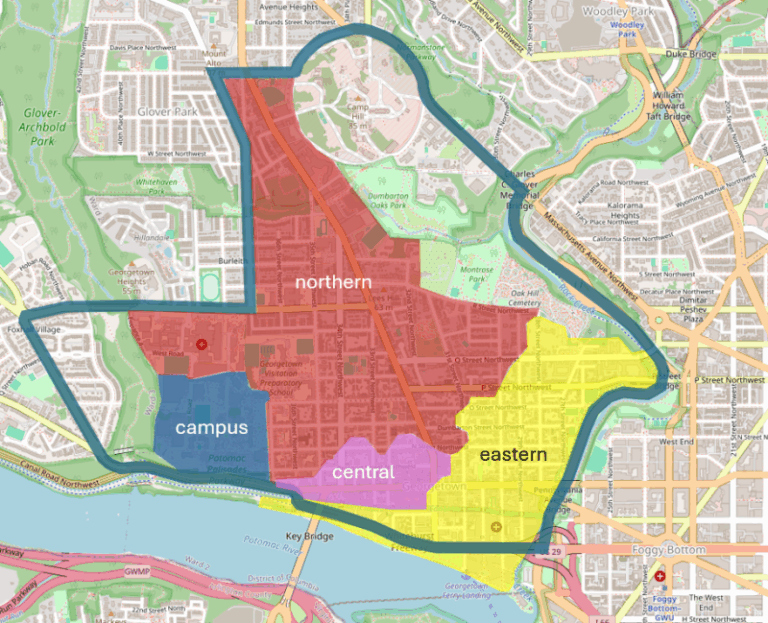Physical Address
304 North Cardinal St.
Dorchester Center, MA 02124
Physical Address
304 North Cardinal St.
Dorchester Center, MA 02124

In Greater Greater Washington, my dad and I have a new editorial explaining how a ring-and-access traffic circulation plan inspired by the Netherlands can keep necessary traffic moving while delivering neighborhood streets and iconic shopping streets from traffic. Read the…

Autonomous vehicles will cause a congestion apocalypse on downtown streets unless we price their use of the roads.
Back a couple years ago, I noted an Econtalk podcast with Russell Roberts and Duke University Professor Mike Munger on the private bus system in Santiago, Chile. This week’s episode starts with Munger’s update on the Santiago transportation system after visiting for three weeks and spending a lot of time traveling the city’s buses and transit. This discussion comes at a perfect time to follow-up on Stephen Smith’s post on private busing in New York. Munger and Roberts discussed the advantages and problems of the evolution of the system over the years. In the case of the private system with over 3,000 competing private bus companies, accidents and injuries were common, and pollution was problematic. However, the regulation and publicization of the buses led to unintended consequences that were probably far worse than the drawbacks of the private system. Unfortunately, although the administration has apologized for the failures of the system, it would be politically impossible to revert to some of the beneficial aspects of the private system.
Mathieu Helie at Emergent Urbanism posted a link to a interesting game created at the University of Minnesota. Mathieu explains it better than I can: The game begins in the Stalinian Central Bureau of Traffic Control, where a wrinkly old man pulls you out of your job at the mail room to come save the traffic control system. You are brought to a space command-like control room and put to work setting traffic lights to stop and go. Meanwhile frustrated drivers stuck in the gridlock you create blare their car horns to get your attention, and if their “frustration level” rises too high you fail out of the level. As the road network gets as complicated as four intersections on a square grid, the traffic becomes completely overwhelming and failure is inevitable, but the old man reassures you that they too have failed anyway. OK, you’ve played the game? If not, don’t go further until you have. Now that you’ve played the game and failed to control traffic, compare that top-down system with this amazing video a friend sent to me from Cambodia. You’ve gotta see this: Man, I love this video! I must have watched it a couple dozen times. I keep expecting a crash, in what to me (only being familiar with top-down planned traffic systems) looks like complete chaos. Yet pedestrians, bikes, motorcycles, scooters, rickshaws, and cars all make it to their destinations safely, and probably quicker than in the system in the game above. It must be similar to how capitalism must seem chaotic to people who have always lived in planned economies. Don’t mistake me as an advocate of a world without traffic signals. I am quite certain that some sort of traffic signaling would likely emerge from a free-market street system. But, my bigger […]
Chris Bradford over at Austin Contrarian has been making some solid points in favor of congestion pricing. (here, here, here and here) Chris’s core argument in favor of congestion tolling is that: congestion pricing does more than relieve congestion. Congestion pricing tells us when a road needs more capacity. Additional capacity costs money, and drivers are willing to pay only so much for it. That “so much” is exactly equal to the price they are willing to pay to avoid congestion. The idea that toll profits send a signal to road operators to produce additional capacity is often neglected in discussions of the benefits of congestion pricing. Without pricing, the only signal is the manifestation of congestion itself. This is problematic, as the only solution is to build more roads when congestion is observed. Actually if done right, years before congestion occurs with the help of foresight and luck on the part of transportation planners and agencies. This problem feeds the dangerous new highway –> sprawl –> congestion –> highway expansion –> sprawl, etc., etc. positive feedback loop. This feedback loop is quite a powerful mechanism that helps drive the unhealthy types of sprawl. Chris is on the right track, but sets a sub-ideal objective (in my opinion) when he says: The optimal congestion toll should be set just high enough to achieve free-flow (45 mph) traffic. Since the goal should not only be to avoid congestion, but to get the highest number of commuters through the system as possible, I would restate that as: The optimal congestion toll should be set at exactly the price that maximizes traffic flow. As Chris said, “Congestion pricing is hard.” Although it seems complicated, you might be shocked at how easy it is, in concept, to price roads optimally. That’s because it’s somewhat […]
Brendan Crain at Where tipped me off to a great post by Ryan Avent at The Bellows. Here’s a little snippet of Shortage: For whatever reason, we’re not built to naturally internalize negative externalities. When riding on a crowded highway, no one (no non-economist, at any rate) curses the government for not making the road more expensive; they demand more capacity — fewer traffic lights, higher speed limits, more lanes, more roads. And when free parking results in no available parking, no one demands market pricing for spots; they ask why the lot’s so small and the garages so scarce, and they get angry about those two new developments that just went in, bringing new residents who unsurprisingly use the valuable, yet free, parking spots when they’re open. We see a shortage of a public good, and we think more, not more expensive. And as a result, the failure to price public goods appropriately leads to an inefficient use of existing resources, and an inefficient allocation of new resources. We don’t use existing roads well, and we spend too much valuable capital building new roads. We don’t use existing parking well, and we spend too much valuable capital building new parking OR we allow shortage concerns to undermine good investments. This type of anti-market bias which seems to be the natural default in humans creates unhealthy positive-feedback loops such as the highway -> development -> congestion -> widen/extend highway, etc. loop. But in that light, we should be glad modern society has been able to overcome so many of its anti-market biases such as making profits, charging interest, and trade between strangers. Hopefully, as society adapts to deal with issues of scacity of land, resources, and time, it will overcome the unhealthy biases it needs to shed to sustain growth. […]
The latest edition of the Atlantic Monthly features an article by John Staddon, a Professor of psychology and brain sciences at Duke University. The article discusses some of the differences in how the US and Britain regulates traffic and how there are unintended consequences to over-regulation. Distracting Miss Daisy: I began to think that the American system of traffic control, with its many signs and stops, and with its specific rules tailored to every bend in the road, has had the unintended consequence of causing more accidents than it prevents. Paradoxically, almost every new sign put up in the U.S. probably makes drivers a little safer on the stretch of road it guards. But collectively, the forests of signs along American roadways, and the multitude of rules to look out for, are quite deadly. Economists and ecologists sometimes speak of the “tragedy of the commons”—the way rational individual actions can collectively reduce the common good when resources are limited. How this applies to traffic safety may not be obvious. It’s easy to understand that although it pays the selfish herdsman to add one more sheep to common grazing land, the result may be overgrazing, and less for everyone. But what is the limited resource, the commons, in the case of driving? It’s attention. Attending to a sign competes with attending to the road. The more you look for signs, for police, and at your speedometer, the less attentive you will be to traffic conditions. The limits on attention are much more severe than most people imagine. And it takes only a momentary lapse, at the wrong time, to cause a serious accident. The tragedy of the attention commons concept reminded me of a video I recently came across on youtube called “Awareness Test.” In fact, the article refers to the […]